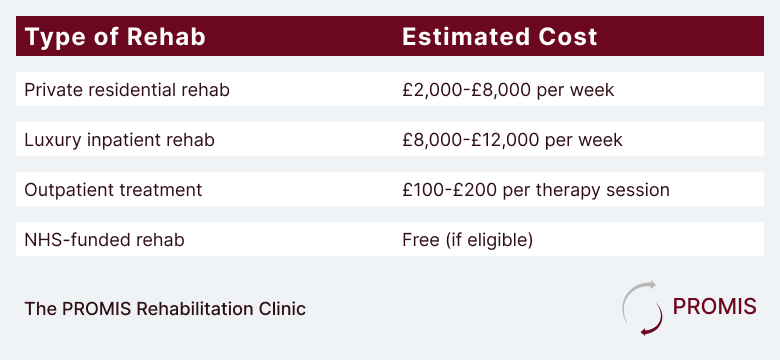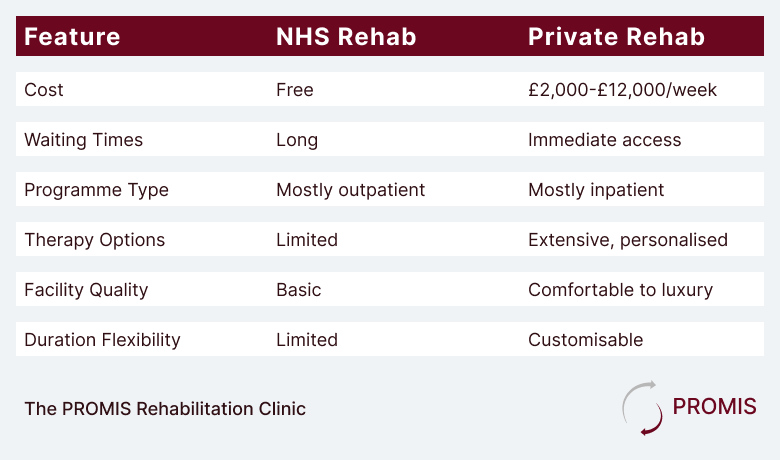How Much Does Rehab Cost in the UK?
Are you wondering how much private rehab costs in the UK? Whether you’re exploring options for yourself or someone close to you, understanding the real cost of rehab is an important first step.
In this guide, we break down the average cost of rehab in the UK, including private residential treatment, outpatient programmes, and free NHS-funded services.
- Private rehab in the UK typically costs between £2,000 and £8,000 per week
- Luxury rehabs may charge £10,000+ per week
- Outpatient treatment ranges from £100 to £200 per session
- NHS rehab services are free, but access is limited and waiting times can be long
At PROMIS, we offer high-quality, personalised rehab programmes tailored to your needs. Below, we explain what influences the cost of addiction treatment and how to find the right rehab programme for you.
Average Cost of Rehab in the UK
The cost of private rehab in the UK varies depending on the type and intensity of care. Here’s a general breakdown:

Some rehab clinics in the UK offer short-term stays (7–10 days), but most effective treatment programmes span at least 28 days, with extended programmes offering 6–12 weeks for deeper healing and relapse prevention.
What Influences the Cost of Rehab?
Level of Care Required
The level of care you need will have a major impact on cost. For example:
- Detox with 24/7 medical supervision is more expensive due to the need for licensed nurses and medication-assisted support
- Inpatient rehab (where you stay full-time at the facility) includes accommodation, meals, therapy sessions, and around-the-clock care
- Outpatient rehab allows you to attend sessions during the week while living at home — it’s more affordable but may not suit complex or severe addictions
At PROMIS, we offer a full spectrum of care, from medically supervised detox to secondary and aftercare programmes, to suit each client’s journey.
Type of Rehab Programme
The type of addiction being treated also affects the cost. Common rehab options in the UK include:
- Alcohol rehab
- Drug rehab (including opioids, cocaine, cannabis, and prescription meds)
- Gambling rehab
- Dual diagnosis treatment (addiction + mental health)
- Luxury addiction treatment programmes with complementary therapies
Some conditions require more intensive care or longer stays. At PROMIS, we personalise every treatment plan based on an in-depth assessment of your medical, psychological, and emotional needs.
Location
Rehab centres in London and other major UK cities often charge more due to higher operating costs and access to specialised professionals. That said, urban locations may offer added benefits such as proximity to family or ongoing work obligations.
Rural rehab clinics, such as PROMIS Hay Farm in Kent, often provide a more peaceful and discreet environment at a more accessible cost, making them a popular choice for those seeking privacy and focus.
Facilities and Amenities
The quality of accommodation and available therapies significantly affects rehab pricing.
- Luxury rehab centres offer ensuite private rooms, gourmet meals, and holistic activities like yoga, massage, and mindfulness
- More affordable centres may offer shared rooms and fewer non-clinical extras
At PROMIS, our rehab facilities are designed to combine clinical excellence with comfort, giving clients a safe and nurturing space to recover.
NHS vs Private Rehab in the UK
When choosing a rehab option, it’s important to compare NHS vs private rehab costs and the level of care you can expect.
NHS-funded addiction services are free, but they often:
- Involve only outpatient rehab
- Require long waiting times
- Provide limited therapy options
In contrast, private rehab offers:
- Immediate admission
- Comprehensive inpatient care
- Personalised treatment plans with specialist therapists
For individuals with urgent needs or those seeking an immersive, confidential experience, private rehab in the UK is usually the most effective option.

How to Pay for Private Rehab in the UK
Private Health Insurance
Some private health insurance providers in the UK offer partial or full coverage for rehab, including detox and therapy. PROMIS can assist you in reviewing your policy to understand what’s included and guide you through the claims process.
Self-Funding
Many clients choose to self-fund their treatment, either through personal savings or family assistance. PROMIS offers flexible options to suit different budgets, with varying lengths of stay available depending on clinical needs and financial preferences.
Government Support and Local Grants
In some cases, local councils or NHS trusts offer funding for residential rehab, especially for those with long-term or severe substance misuse issues. These services usually require a referral from your local Drug and Alcohol Recovery Service (DARS).
Crowdfunding and Family Support
Some families explore crowdfunding platforms to help cover rehab costs. If this is a route you’re considering, our team can support you with planning and transparency to make the process easier.
Begin Your Healing Journey With PROMIS
If you’re researching how much rehab costs in the UK, the answer will depend on your needs, the type of care required, and how urgently treatment is needed.
At PROMIS, we offer private addiction treatment programmes tailored to your situation, whether you’re seeking help for alcohol addiction, drug misuse, or co-occurring mental health conditions. Our clinics in Kent and London provide discreet, high-quality care in safe and tranquil environments.
Frequently Asked Questions
How much does alcohol rehab cost in the UK?
Private alcohol rehab typically costs between £2,000 and £8,000 per week, depending on the location, treatment length, and type of therapy provided.
Is private rehab worth the cost?
Yes. If you’re looking for immediate access, personalised care, and a structured environment that supports long-term recovery, private rehab offers significant benefits. PROMIS combines decades of clinical experience with a compassionate and luxurious setting.
What’s the cheapest private rehab in the UK?
Some centres start at around £2,000 per week, but prices vary based on treatment intensity and amenities. While affordability matters, it´s vital to prioritise quality care and safety over cost alone.
How much does a 28-day rehab programme cost in the UK?
A standard 28-day residential rehab programme in the UK typically costs between £4,000 and £12,000, depending on the clinic, treatment level, and amenities. Luxury rehabs with private rooms, holistic therapies, and specialist care tend to be at the higher end of this range.
What is the cheapest way to go to rehab in the UK?
The most affordable way to access rehab in the UK is through NHS-funded outpatient services, which are free if you're eligible. Some local councils also provide funding for detox or residential treatment. While waiting lists can be long, these services are a vital option for those who can't afford private care.
Does health insurance cover rehab in the UK?
Some private health insurance policies in the UK do cover addiction treatment, including detox, therapy, and residential rehab. Coverage varies depending on your provider and plan, so it’s important to check the terms and speak with your insurer. PROMIS can help verify your benefits and guide you through the process.
